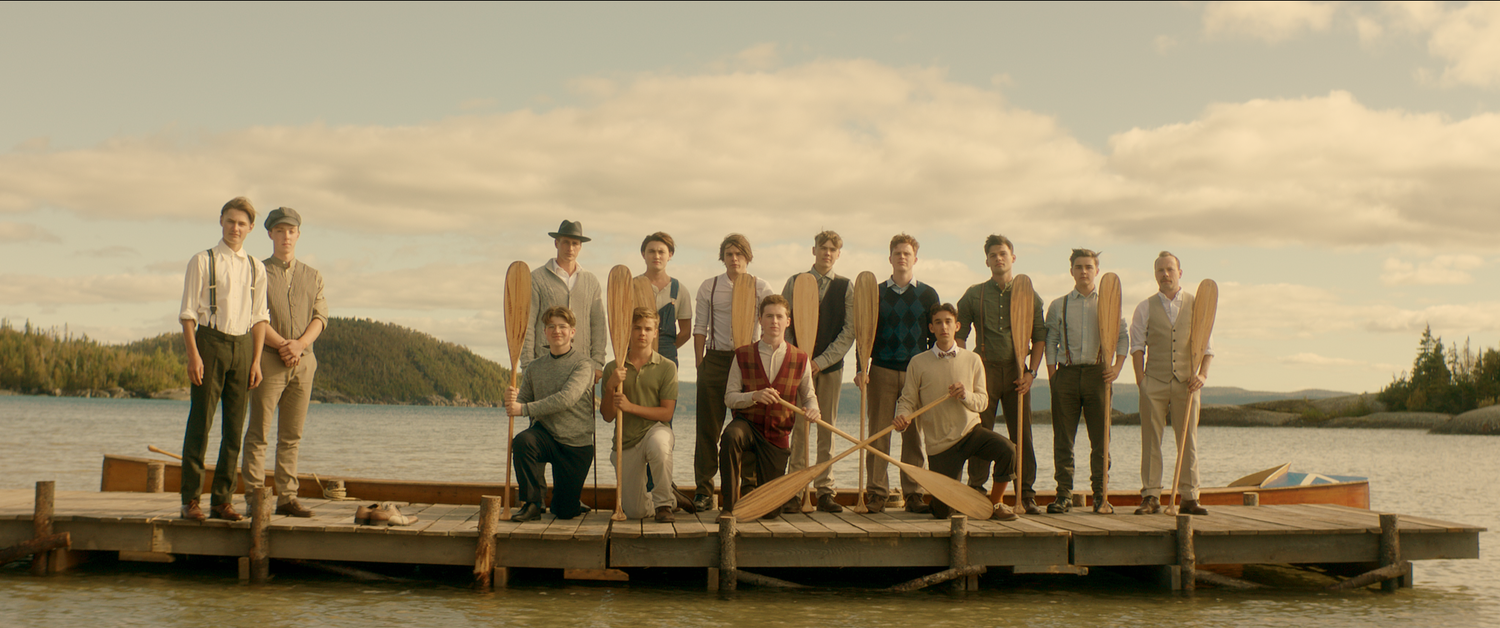Brotherhood, Canadian Movies and the Streaming Audience that Loves Them
By Jim Slotek
I have a theory about Canadian movies. It’s based on nothing but nearly empty theatres where I’ve watched them, and robust clicks of our reviews once the films hit streaming services.
My hot take: Canadians actually embrace Canadian movies and watch them by the hundreds of thousands. They’ll watch them on their phone, on their TV, on their laptops, heck, maybe even on their Apple watches – anywhere but a movie theatre.
That’s not the audience’s fault. The release model for Canadian films sees them rushed in and out of theatres like a commuter with a bus to catch. Advertising budget? What’s that?
Brotherhood: Who will survive the impending 1926 disaster?
Which brings me to Brotherhood, director Richard Bell’s take on a 1926 canoeing tragedy that saw teenagers from the Brotherhood of St. Andrew caught up in a freak Kawarthas storm on Balsam Lake with fatal results.
The film, which stars Brendan Fehr, Brendan Fletcher, and Jake Manley, won a Canadian Screen Award for Achievement in Visual Effects.
The historical event still resonates in the consciousness of Northern Ontarians, such that outlets like the Sault Star and the Lindsay Advocate saw it as newsworthy when the movie showed up on CBC Gem late last year.
Streaming service numbers are hard to gauge, but the numbers I see on this blog’s analytics show thousands of people interested enough to click our little site. That Brotherhood review I wrote more than two years ago is suddenly one of the most read on the site on a daily basis. It got nowhere near that kind of attention when the movie was in the usual handful of theatres.
Brotherhood is particularly unusual, because breakthrough Canadian films online are usually genre – horror, lo-fi sci-fi, etc. Movies like Geoff Redknap’s invisible man movie The Unseen, Audrey Cummings’ supernatural action film She Never Died or Danishka Esterhazy’s dystopian Level 16 have a life of their own on streaming services. Indigenous films have also embraced genre, with Jeff Barnaby’s Blood Quantum (zombies) and Danis Goulet’s Night Raiders (post-apocalyptic dystopia).
But Brotherhood is Canadian enough in a traditional way to make anyone who’s ever held a paddle bleed maple syrup. It’s nature in the raw, and kids singing Land of the Silver Birch by the campfire.
Director Bell says word-of-mouth from his aggressive efforts to get Brotherhood into small town theatres may be responsible for the numbers it’s getting online now. “Brotherhood was received favourably in smaller towns and regions where people still have a strong sense of Canadiana, pride in community and love of history,” he says.
“I approached theatres directly… akin to a fisherman bringing his fish directly to the restaurant. I paid out-of-pocket for Facebook and Instagram ads, targeted for each region.” Between pandemic waves, he says, “I was able to get more promotion for the 95th anniversary of the real event in July 2021, and that turned into another run of theatrical screenings, that went until Remembrance Day. I used the Great War backstory in the film as a connection.” The film even managed a two-week booking at Toronto’s Yonge/Dundas Cineplex, as opposed to the usual one.
Bell’s extreme efforts inspired him to write a case study for Telefilm, candidly running through the obstacles and apathy he faced getting a finished film from the editing suite to the screen.
When and if the theatre chains get back on their feet, there’s no guarantee they’ll be doing Canadian movies any favours. For certain movies, it may be time to think past the box office.
MOLECULES TO MAKE YOU DROOL: As long as we’re extolling CBC Gem for Brotherhood, we’ll give it a shout-out on another subject. We direct you to Chef Secrets: The Science of Cooking, a fun documentary that aired Friday on The Nature of Things and is viewable on Gem.
“Fun” and “science” have been estranged bedfellows lately, especially on as relevancy-minded a show as Dr. David Suzuki’s. Because of the state of the world, science tends to be about apocalyptic things like climate, pollution, pandemics, etc.
Hosted by molecular research scientist Anthony Morgan, Chef Secrets: The Science of Cooking, introduces us to Ali Bouzari, who “has a PhD in mashed potatoes” (spoiler: for molecular reasons, the perfect mashed potatoes should be boiled whole, with the skin on), “ice cream scientist” Maya Warren, Britain’s “Queen of Sourdough” Vanessa Kimbell, who explains the relationship between yeast, sugar and carbon dioxide as a kind of chemical party, world-renowned chef and Wet’suwet’en hereditary chief Andrew George who analyzes the perfect smoked salmon, and more.
In our house, we’re contemplating replicating Warren’s at-home no-churn ice cream.

